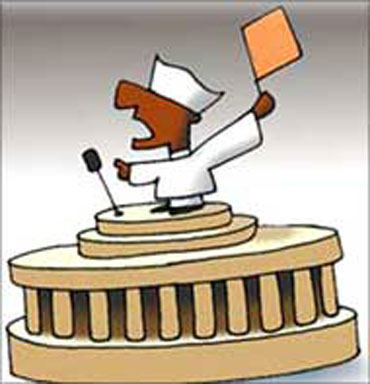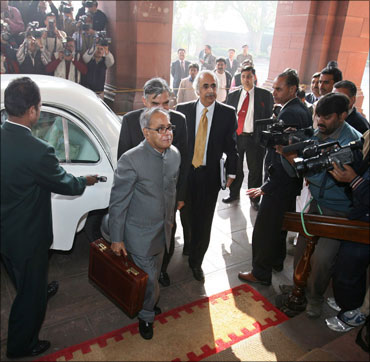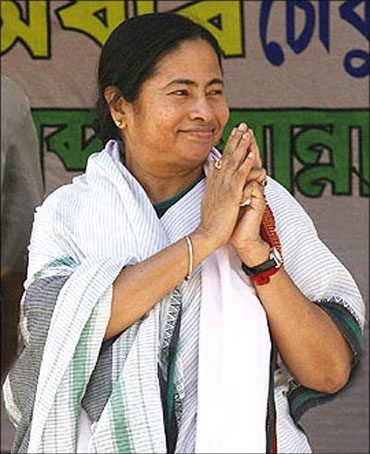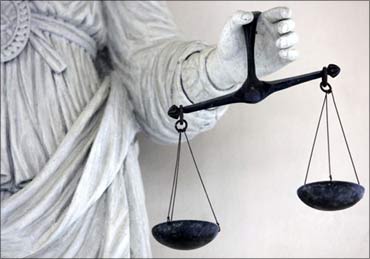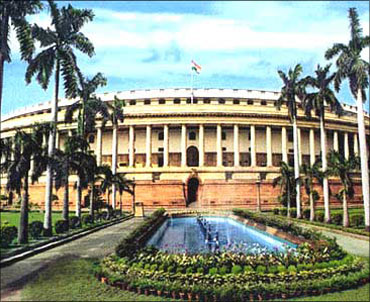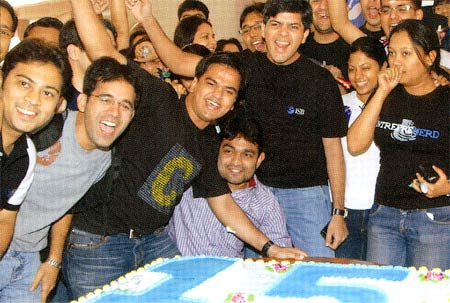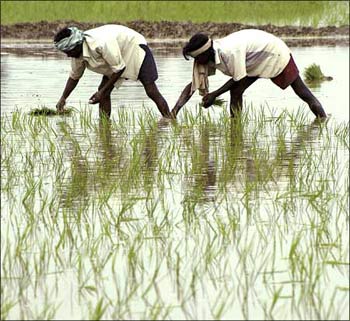 | « Back to article | Print this article |
Here's what our MPs will decide in Budget Session
Parliament met on Monday for the Budget Session, starting with the President's address. This session will likely focus on financial issues, other debates on important national issues, and legislative Bills.
After the Winter Session was completely washed out, we hope that Parliamentarians will perform the important functions of scrutinising legislative proposals and holding the government to account using Parliamentary mechanisms.
Financial business
The first few days of the session will see the government releasing the Economic Survey, and the Railway Budget and the Union Budget.
The Economic Survey provides the finance ministry's assessment of the state of the economy, and could also provide some insights into its medium economic strategy.
Last year, the survey had discussed the possible mechanisms of vouchers and cash transfers as an alternative to the current public distribution system; the government last week announced a task force to examine the feasibility of this mechanism.
Click NEXT to read on . . .
Here's what our MPs will decide in Budget Session
The Union Budget needs to be a fine balancing act. In the televised press conference last week, the prime minister reiterated the need to maintain high growth.
At the same time, inflationary pressures threaten to destabilise the growth momentum and have adverse political consequences. The fiscal balance this year was rescued by high tax collections and the large amounts raised through the 3G spectrum licence.
With expenditure rising, and no respite on the food and oil subsidy bills, the finance minister will have to take some hard decisions in order to lower the fiscal deficit next year.
Debates on national issues
The deadlock over the formation of a Joint Parliamentary Committee seems to have been broken. Neither the proposed terms of reference of the committee nor its composition are known; there could be some grandstanding on these issues by political parties.
We are also likely to see some lively debates on various issues such as corruption (in the context of the Commonwealth Games, the Antrix Dewas deal, and the 2G spectrum allocation), black money held abroad, and food price inflation.
Click NEXT to read on . . .
Here's what our MPs will decide in Budget Session
Impeachment
Parliament will also see a rare event -- the impeachment of a high court judge. The Rajya Sabha chairman has accepted the tabling of a motion to remove Justice Soumitra Sen of the Calcutta high court.
After the motion was initially introduced, a three-member inquiry committee has recommended that Justice Sen be removed from office. This motion needs to be passed by two-third majority in each house of Parliament.
Till now, only one such case has occurred before -- that of Justice Ramaswamy, where the impeachment motion was not passed. The inquiry process is also underway for the impeachment of Chief Justice Dinakaran of Sikkim high court (earlier Karnataka high court).
Legislative business
The government has listed 34 bills for passing, and a further 32 for introduction during the session.
On the higher education front, the human resources development minister had last year introduced four bills that would change the regulatory structure of the sector.
Click NEXT to read on . . .
Here's what our MPs will decide in Budget Session
The Education Tribunals Bill was passed by Lok Sabha, and discussed by Rajya Sabha; however, the upper house deferred the bill to this session, in order to examine it more thoroughly.
This Bill -- which sets up tribunals to adjudicate disputes between colleges, universities, students, staff and statutory regulators -- has been listed for consideration and passing.
The other three Bills are still pending with the HRD standing committee. One of these defines unfair practices such as capitation fees, the second establishes accreditation agencies to provide quality ratings (similar to credit ratings for financial securities), and a third permits the entry of foreign universities.
Two important Bills related to higher education are listed for introduction. The National Council for Higher Education and Research changes the broad regulatory structure.
An earlier draft indicated that the new council would replace the Universities Grants Commission and the All India Council for Technical Education. It also sought to increase the autonomy for universities.
Click NEXT to read on . . .
Here's what our MPs will decide in Budget Session
The National Commission for Human Resources for Health Bill will establish a new regulator for medical education.
It is likely to replace the Medical Council of India, the Dental Council, the Nursing Council, etc, which currently regulate the different aspects of healthcare education.
The Companies Bill will likely be discussed during the session. This bill replaces the current Companies Act. It proposes significant changes such as shifting the burden of oversight from the government to shareholders; and moving a number of items from the act to the subordinate legislation.
The tax structure is also being thoroughly overhauled. The Direct Tax Code bill is being examined by the standing committee on finance. This bill removes most exemptions for companies. It also widens the tax slabs for individuals.
The government has also listed a constitutional amendment bill as a pre-cursor to the introduction of a goods and services tax. If implemented, this tax would replace most indirect taxes, and facilitate inter-state trade of goods.
Click NEXT to read on . . .
Here's what our MPs will decide in Budget Session
The Seeds Bill has been pending for six years. The standing committee had recommended several changes -- including removing inter-farmer sale of seeds from the purview of this law -- which the government has accepted.
The Pesticides Bill, which replaces the insecticides act and makes it more broad-based, is also listed for consideration.
The government has also listed the Copyright (Amendment) Bill. This bill provides directors of films copyright to be shared with the producer -- it also increases the copyright term to 60 years.
Controversially, it prohibits music composers and lyricists from assigning their rights to anyone other than a copyright society for use of their songs in media other than films or song recordings; this follows a demand from them stating that film producers force them to part with these rights, especially for ring tones and caller tunes used in mobile phones.
The UPA-2 government's first presidential address had listed 13 bills on its 100-day priority list.
Click NEXT to read on . . .
Here's what our MPs will decide in Budget Session
Over 600 days later, the government has ticked off just one -- the Right to Education Bill.
It is imperative that other important Bills are examined carefully by Parliament (both in committee and the floor of the house), and passed.
Parliament also needs to scrutinise the government's Budget proposals before accepting them. Other issues also need to be debated.
We hope that this session witnesses constructive debate, and that our MPs discharge their legislative and representative duties to the best of their ability.
M R Madhavan is Head of Research at PRS Legislative Research. He can be contacted at madhavan@prsindia.org
